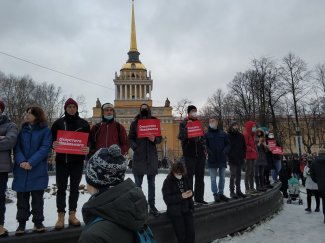Alexei Navalny’s organisations to be recognised as ‘extremist’

On 16 April, the Moscow prosecutor’s office asked the Capital City Court to designate the organisations created by Alexei Navalny as ‘extremist organisations’. This applies to the Anti-Corruption Foundation, the Foundation for Protection of Citizens’ Rights and the regional political headquarters. According to the official announcement, “under the guise of spreading liberal slogans” these entities have been “creating conditions for the destabilisation of the socio-political situation” in Russia, and are striving to “change the foundations of the constitutional order”, which also includes the ‘colour revolution’ scenario. Moreover, according to the prosecutor’s office, Navalny’s organisations work for foreign entities which have been recognised in the country as “undesirable organisations”. It was therefore decided that they are engaged in “extremist activities”.
Under Russian law, the consequences of designating an organisation to be extremist are as follows:
- its leadership can be held criminally responsible for “organising the activities of an extremist organisation” (a charge which carries a maximum sentence of ten years’ imprisonment);
- participation in its activities is punishable by a penalty of up to six years, and financing it by up to eight years’ imprisonment;
- anyone organising, financing or participating in extremist activity risks being entered on the list of extremists, which means their bank accounts can be blocked and they are limited to spending only 10,000 roubles (just over $130) per month per person in their family;
- the organisation has no right to organise public events, and is also forbidden to show any of its symbols or logos in public (the latter, together with a fine or arrest, carries with it the suspension of passive suffrage for a period of one year);
- any mention of the organisation in the media will require its ‘extremist’ status to be emphasised.
The prosecutor’s request was preceded by another wave of repression against the employees of Navalny’s regional headquarters. For example, a staff coordinator in St. Petersburg was sentenced to 10 days’ detention for ‘organising an illegal protest’ on 31 January. In Makhachkala, the day after a new facility was opened there, its coordinator was arrested. In addition, activists in Krasnodar and Voronezh were detained, and searches were carried out at other regional headquarters.
Commentary
- The likely designation of Navalny’s network as extremist organisations may prove to be a very serious instrument of political repression. From the previous application of the law punishing such organisations’ activities, it appears that the courts may sometimes impose the penalties retroactively(!), which means that anyone who has disseminated pro-Navalny materials on social media in recent years may be punished. It is possible that the authorities will demand that all such content be removed from the Internet, regardless of when it was posted – including the results of anti-corruption investigations (although technically the designation of specific material as extremist requires a separate procedure).
- The opposition activist’s associates have linked the prosecutor’s request to the plan, announced a few weeks ago, to organise an all-Russian protest in Navalny’s defence. A specific date was to have been set after 500,000 signatures declaring participation were collected online. The action, however, has now been moved up: it will take place on 21 April, on the day of Vladimir Putin’s annual address to the joint chambers of parliament.
- September’s elections to the State Duma provide a broader context for recent events. The Kremlin wants to paralyse the activities of Navalny’s network, which have been actively promoting the project of ‘smart voting’, the aim of which is to break the political monopoly of United Russia, the party of power. This project involves encouraging citizens to vote in parliamentary elections and annual regional elections for those individuals who have the best chance of defeating the regime’s candidates.
- It is very unlikely that the court will reject the prosecutor’s request. Tackling the results of being given ‘extremist’ status will be the most serious challenge to date for both Navalny’s team and his supporters. One ad hoc response could be to dismantle the old structures and establish new ones, but it would only be a matter of time before these too would be designated extremist. In the long run, the only alternative to ceasing their activities completely would seem to be transferring the whole operation online and running it from abroad. However, the question arises as to what extent such a strategy will prove successful in the long run. It was the belief that acting from outside the country would inevitably mean political non-existence which prompted Navalny to return to Russia in January this year. Moreover, Russian law would compel internet hosts to block any content deemed extremist.





